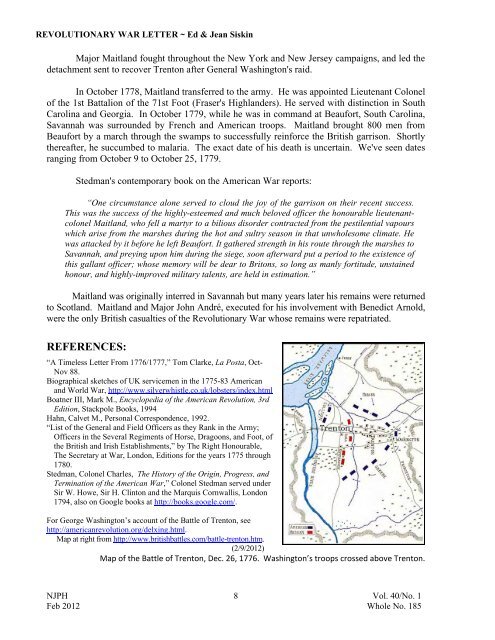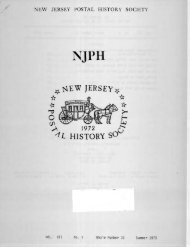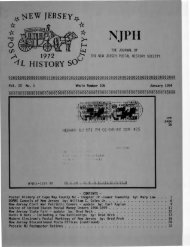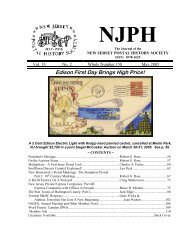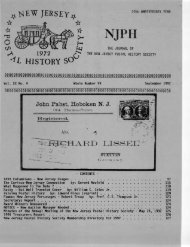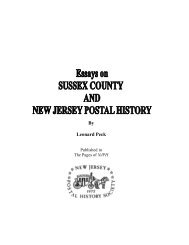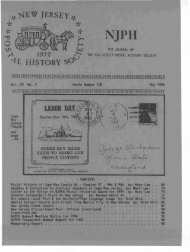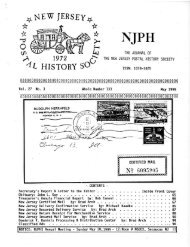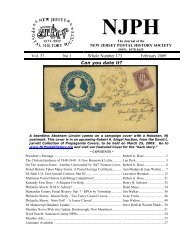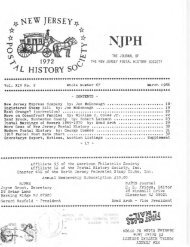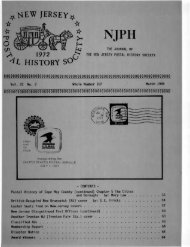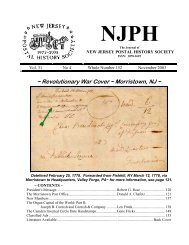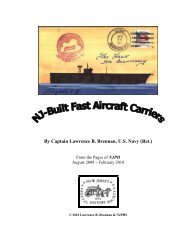185 - New Jersey Postal History Society
185 - New Jersey Postal History Society
185 - New Jersey Postal History Society
You also want an ePaper? Increase the reach of your titles
YUMPU automatically turns print PDFs into web optimized ePapers that Google loves.
REVOLUTIONARY WAR LETTER ~ Ed & Jean Siskin<br />
Major Maitland fought throughout the <strong>New</strong> York and <strong>New</strong> <strong>Jersey</strong> campaigns, and led the<br />
detachment sent to recover Trenton after General Washington's raid.<br />
In October 1778, Maitland transferred to the army. He was appointed Lieutenant Colonel<br />
of the 1st Battalion of the 71st Foot (Fraser's Highlanders). He served with distinction in South<br />
Carolina and Georgia. In October 1779, while he was in command at Beaufort, South Carolina,<br />
Savannah was surrounded by French and American troops. Maitland brought 800 men from<br />
Beaufort by a march through the swamps to successfully reinforce the British garrison. Shortly<br />
thereafter, he succumbed to malaria. The exact date of his death is uncertain. We've seen dates<br />
ranging from October 9 to October 25, 1779.<br />
Stedman's contemporary book on the American War reports:<br />
“One circumstance alone served to cloud the joy of the garrison on their recent success.<br />
This was the success of the highly-esteemed and much beloved officer the honourable lieutenantcolonel<br />
Maitland, who fell a martyr to a bilious disorder contracted from the pestilential vapours<br />
which arise from the marshes during the hot and sultry season in that unwholesome climate. He<br />
was attacked by it before he left Beaufort. It gathered strength in his route through the marshes to<br />
Savannah, and preying upon him during the siege, soon afterward put a period to the existence of<br />
this gallant officer; whose memory will be dear to Britons, so long as manly fortitude, unstained<br />
honour, and highly-improved military talents, are held in estimation.”<br />
Maitland was originally interred in Savannah but many years later his remains were returned<br />
to Scotland. Maitland and Major John André, executed for his involvement with Benedict Arnold,<br />
were the only British casualties of the Revolutionary War whose remains were repatriated.<br />
REFERENCES:<br />
“A Timeless Letter From 1776/1777,” Tom Clarke, La Posta, Oct-<br />
Nov 88.<br />
Biographical sketches of UK servicemen in the 1775-83 American<br />
and World War, http://www.silverwhistle.co.uk/lobsters/index.html<br />
Boatner III, Mark M., Encyclopedia of the American Revolution, 3rd<br />
Edition, Stackpole Books, 1994<br />
Hahn, Calvet M., Personal Correspondence, 1992.<br />
“List of the General and Field Officers as they Rank in the Army;<br />
Officers in the Several Regiments of Horse, Dragoons, and Foot, of<br />
the British and Irish Establishments,” by The Right Honourable,<br />
The Secretary at War, London, Editions for the years 1775 through<br />
1780.<br />
Stedman, Colonel Charles, The <strong>History</strong> of the Origin, Progress, and<br />
Termination of the American War,” Colonel Stedman served under<br />
Sir W. Howe, Sir H. Clinton and the Marquis Cornwallis, London<br />
1794, also on Google books at http://books.google.com/.<br />
For George Washington’s account of the Battle of Trenton, see<br />
http://americanrevolution.org/delxing.html.<br />
Map at right from http://www.britishbattles.com/battle-trenton.htm.<br />
(2/9/2012)<br />
Map of the Battle of Trenton, Dec. 26, 1776. Washington’s troops crossed above Trenton.<br />
NJPH 8<br />
Vol. 40/No. 1<br />
Feb 2012 Whole No. <strong>185</strong>


